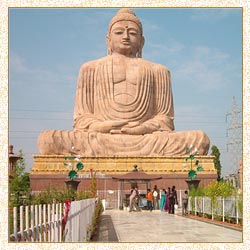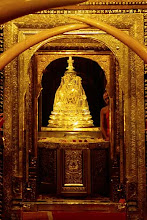
| |
|
|
Buddhist view of marriage
There are no short-cuts to happiness in married life. There may have misunderstandings, jealousy, anger and suspicion. Understanding and tolerance required to overcome such feelings. Both partners must try to be the right person by acting out of mutual respect, love and concern for each other. In a successful marriage, a partner must not always try to get things his or her own way. I remember a humorous saying ‘man has his will but woman has her way’. It is not always easy to tread on a mutual path by both. It may be un-even, bumpy and sometimes difficult.
The concept of the family is the most sacred institution of individual and social living. The cultural and social progress of humanity depends, to a large extent, on the inviolability of this sacred thread of family life.
This concept is enshrined in the third precept of the Panca-sila, which enjoins a person to abstain from misconduct in sexual behaviour. According to this precept no individual has any right whatever to disturb the serenity and harmony of the family-life of any person.
It should be possible for any right-thinking individual to vsualize the most baneful and unlimited extent of calamity and frustration that could be brought about in a family by any form of laxity in this direction. Therefore, any shady or wrongful sexual indulgence on the part of anyone in society should be looked upon as a very grievous crime against the very grain of society. It has also been emphatically stressed in Buddhist texts that the violation of this principle not only degenerates the individual but also entails loss of wealth and prestige, causing lasting calamity to the individual himself and general social structure at large.
The Buddha’s teaching rightly advises everyone to abstain from this very grievous social malady.
In the Bible there is a saying that female became woman because she was created with a bone taken out of man’s rib. The man and woman can become one flesh by their marriage.
“And Adam said, ‘this is now bone of my bones, and flesh of my flesh; She shall be called woman because she was taken out of man. Therefore, shall a man leave his father and his mother, and shall cleave unto his wife; and they shall be one flesh.”
In a marriage both the husband and wife must think more of the partnership than they do of themselves. This partnership is an interweaving of interests, and sacrifices will have to be made for the sake of both parties. It is from mutual understanding and concern that security and contentment in marriage can be established.
There are no short-cuts to happiness in married life. There may have misunderstandings, jealousy, anger and suspicion. Understanding and tolerance required to overcome such feelings. Both partners must try to be the right person by acting out of mutual respect, love and concern for each other. In a successful marriage, a partner must not always try to get things his or her own way. I remember a humorous saying ‘man has his will but woman has her way’. It is not always easy to tread on a mutual path by both. It may be un-even, bumpy and sometimes difficult.
A husband and wife must learn to share the happiness and pain in their daily life. There may be pitfalls. The friends of both parties might try to have association in the way before the marriage. Sometimes friends might try to fool a partner with drugs. If you want to have a happy married life, you should always be on to alert such pitfalls. Some friends come to rent a room of your house. That sort of a friendship might end up with marital problems.
Most of the marital problems and worries which normally arise are due to an unwillingness of one partner to compromise and be patient with the other.
There is another way. When the poverty comes in the front door, love runs away from the back door. So you must know financial management and have protected or saved money for any emergency.
Human beings are emotional and hence are liable to get into arguments which lead them to be angry. If both parties are not angry at the same time problems can be easily resolved. The Buddha once admonished that the husband should keep the wife’s honour and respect while the wife keeping her husband’s honour and respect everywhere. Both partners should exchange gifts on special days like birthdays.
There was a very hot tempered woman who always scolded her husband for minor mistakes by saying, ‘you are a very stupid man. The husband was a very tolerant man and kept quiet when he was scolded. However, one day when the wife shouted ‘you are an idiot’, the husband said ‘I think you are right. If I am not an idiot, do you think I would ever have married a woman like you?’ He did not use any bad words.
Sex is much more than physical gratification. It is the basis for an intimate life-long companionship. Without intimacy there can be no real love. Intimacy is the sharing of feelings, not information. Couples who are not intimate will tend to talk of frivolous subjects like weather, latest TV shows, or what to eat for the dinner.
Married couple should make every effort to cultivate the timeless virtues of love, fidelity, and decency.
Montaigne jokes about married life saying ‘A good marriage would be between a blind wife and a deaf husband’.
There is a saying that ‘Marrying a particularly attractive partner is like buying a second hand motor car’ because both can entail extra responsibilities.
There was once an elderly man who was not satisfied with one wife to whom he had been married for some years. He decided to take on a second wife who was charming and beautiful. Now, this second wife felt rather embarrassed to be seen with such an old man. So, in order to make him look young, she spent a lot of time plucking out all the grey hairs that had appeared on his head. When the first wife noticed this, she began to pull out his black hairs one by one, hoping to make him appear older. This contest between the two of them went on and in the end, the man became completely bald, with neither a single grey hair nor black hair on his head.
Another story goes like this. First ten years the husband speaks to the wife. The next ten years the wife speaks and the husband listens. During the third ten years both husband and wife speak together and the neighbours listen!
The Poruwa Sirita (Poruwa Tradition) is the Sinhala marriage ceremony that has been observed throughout 2500 years of recorded history of Sri Lanka. It is a blend of social, cultural and spiritual elements and is not a religious ceremony it is an admixture of both Sinhala and Buddhist customs.
The “Poruwa” is a word derived from “Puwaruwa” meaning plank. Ancient coronation ceremonies were done on a plank of a special tree called “Dimbul”. Here the Poruwa structure on which the marriage ceremony takes place symbolises the entrance to a household the household of marriage.




